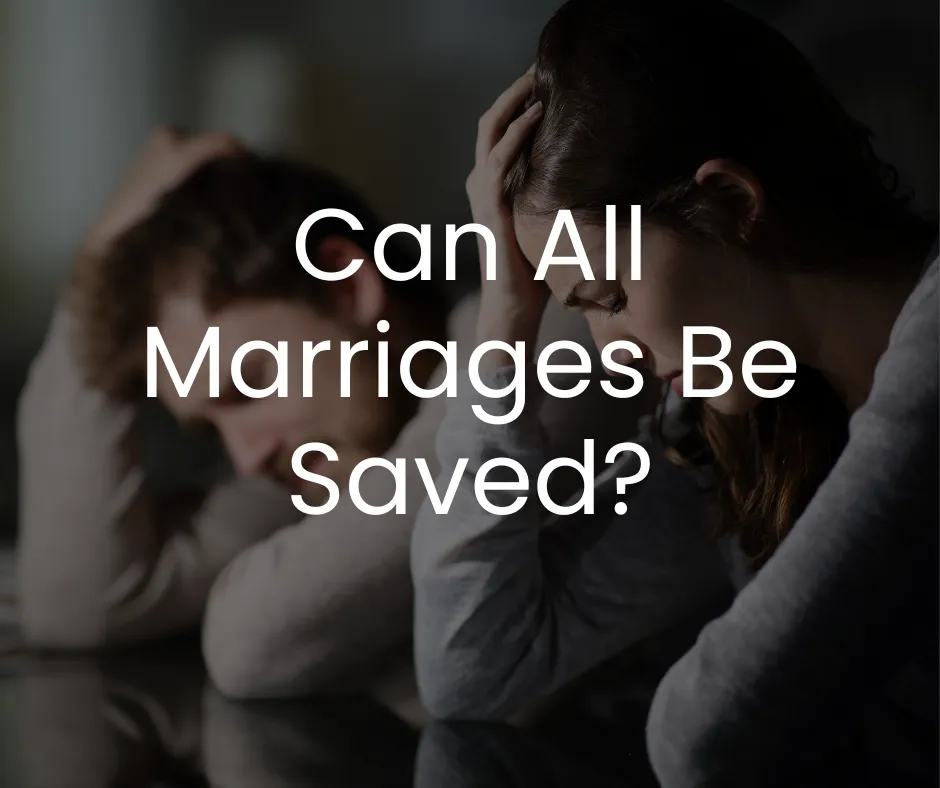
Can All Marriages Be Saved?
This might be one of the most profound and heart-wrenching questions I’m asked. It often comes whispered through tears or typed in late-night messages by someone standing at a crossroads in their most important relationship.
The person asking usually hopes for a simple “yes” or “no,” but deep down, they already know the answer isn’t that simple. Let me offer something more honest—and more hopeful—than a one-word response.
The Foundation: Two People, One Choice
At its core, marriage is a daily choice made by two individuals to stay committed and connected. It’s not a one-time decision sealed at the altar. Instead, it’s a choice we make in small moments:
Choosing to stay open when shutting down feels easier.
Reaching out when pulling away feels safer.
Choosing “us” when “me” feels more comfortable.
When both partners are making this choice—even imperfectly—there’s something to build on. No matter how shaky the foundation feels, it’s still a foundation.
But when one partner stops making that choice—when they’ve emotionally or physically left the relationship—what remains isn’t truly a marriage anymore. At that point, it’s one person holding space for something that no longer exists in its mutual form.
Here’s the hard truth: you can’t have a relationship with someone who isn’t choosing to have one with you.
The Plot Twist: When One Partner Changes the Story
And yet, this is where hope often appears in unexpected ways.
Over the years, I’ve witnessed something remarkable: marriages that seemed irretrievably broken—where one partner had emotionally checked out, filed for divorce, or declared it over—transform because one person decided to change.
When one partner begins practicing unconditional love, something shifts.
I’ve seen separated couples reunite, partners who swore they were “done” become curious again, and relationships that were all but dead come back to life. Why? Because one person’s genuine transformation can create a ripple effect.
This isn’t about manipulation or “winning” someone back. It’s about one person fundamentally changing how they show up—becoming calmer, clearer, and grounded in unconditional love. That change can inspire curiosity and even hope in the other partner.
When you truly embody unconditional love, you become someone different. And sometimes, that’s enough to reignite the possibility for a relationship that once seemed lost.
When Both Partners Say “Yes”
If both partners want to save the marriage, the potential for transformation increases dramatically. But desire alone isn’t enough.
Imagine two people wanting to speak Italian to each other. If neither learns the language, their desire won’t matter—they’ll remain unable to communicate.
Saving a marriage works the same way. Both partners might desperately want to fix things, but if they keep using the same tools and patterns that created the problems—blame, defensiveness, avoidance—they’ll keep getting the same painful results.
The key isn’t just wanting to stay together. The key is learning how to love differently.
The Real Question: Are You Willing to Learn?
Here’s where everything hinges: willingness.
Not just a willingness to stay together, but a willingness to go deeper, to question everything you thought you knew about love, and to open yourself to a new way of being in a relationship.
Ask yourself:
Are you willing to see your partner with fresh eyes?
Are you ready to examine your own patterns and take responsibility for your role in the relationship?
Can you prioritize learning and growth above your ego, above being “right,” and above the comfort of the status quo?
The marriages that transform are those where at least one partner—and ideally both—fully commit to this process. They don’t dabble. They don’t half-heartedly try. They recognize that their marriage, their happiness, and their way of loving are at stake, and they show up accordingly.
The Honest Answer
So, can all marriages be saved? No, not all.
Some relationships have run their course. Some involve dynamics that are toxic or harmful. Others involve people who have grown so far in directions that they no longer seem to align.
But the more personal question is, Can your marriage be saved?
That depends on factors only you can assess:
Are you both still choosing to be in the relationship, even reluctantly?
Are you willing to learn something radically different?
Can you prioritize this learning above everything else?
Can you remain open to transformation, even when it feels uncomfortable?
And here’s the surprising truth: sometimes, even if only one partner is willing to do this work, it can be enough to shift everything.
A Final Thought
The question, “Can all marriages be saved?” often hides the deeper, more personal question: Is there hope for mine?
If you’re asking this, it means some part of you hasn’t given up. Honor that.
Whether your marriage transforms into something beautiful or whether your journey leads you elsewhere, learning about unconditional love will never be wasted. It will change how you show up in the world, how you relate to others, and how you understand love itself.
Sometimes, that change is exactly what a marriage needs to not just survive, but to become something more beautiful than you ever imagined.
Are You Ready to Begin?
True transformation begins with a willingness to see love differently. If you’re ready to learn about unconditional love and discover what’s possible when even one partner embraces this path, we’re here to support you.
Because every marriage deserves the chance to become something extraordinary. Book a call here


